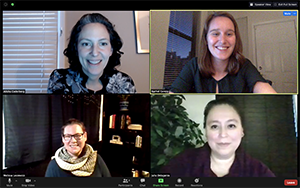NASFAA Continues Virtual Advocacy Pipeline to Emphasize Need for Additional Pandemic Relief
By Owen Daugherty, NASFAA Staff Reporter
In light of the ongoing pandemic, NASFAA last month held its second virtual Advocacy Pipeline event, during which three NASFAA members all hailing from Michigan met with congressional staffers representing lawmakers from the Great Lakes State, in an effort to have the financial aid community continue participating in direct advocacy despite the limitations brought on by the coronavirus.  The three NASFAA members — Melissa Lesiewicz of Mott Community College, Alisha Cederberg of Kalamazoo Valley Community College, and Julia Delagarza of Eastern Michigan University — convened for the virtual event at a time when Congress was in the midst of negotiations over a year-end spending bill and another federal stimulus package, which was ultimately passed and signed into law late last month and includes several policy provisions related to financial aid and higher education.
The three NASFAA members — Melissa Lesiewicz of Mott Community College, Alisha Cederberg of Kalamazoo Valley Community College, and Julia Delagarza of Eastern Michigan University — convened for the virtual event at a time when Congress was in the midst of negotiations over a year-end spending bill and another federal stimulus package, which was ultimately passed and signed into law late last month and includes several policy provisions related to financial aid and higher education.
The members on Dec. 17, 2020, met with staff of five members of Congress representing their home state and districts — including Rep. Fred Upton, a Republican, Democoratic Reps. Debbie Dingell and Dan Kildee (D-Mich.), and Democratic Sens. Gary Peters and Debbie Stabenow — to discuss legislative priorities such as eliminating student loan origination fees, curbing excessive indebtedness, making improvements to the Parent PLUS Loan program, simplifying the FAFSA, and highlighting the importance of emergency funds received through the Coronavirus Aid, Relief, and Economic Security (CARES) Act. The group also shared the challenges facing their students amid the pandemic and emphasized the need for additional COVID-19 relief funds.
We asked the advocacy pipeline participants to share their thoughts and takeaways. Read on to learn about their experiences, and fill out an interest form if you would like to participate in a virtual Advocacy Pipeline.
Julia Delagarza, Assistant Director of Training and Compliance, Eastern Michigan University
All the offices we spoke to were prepared with a higher education background and asked questions about our topics. They also asked questions about CARES Act funding and how we used those dollars and flexibilities to help our students. I was pleasantly surprised at how interested they were in our work and how their work impacted our students. While the time seemed to go by quickly, I was happy with how responsive they were about our recommendations.
After [President Donald Trump] signed the 2021 fiscal year omnibus spending bill, we saw some of the issues we advocated for in the text. I'm sure these were on the list for a long time, but it was encouraging to see changes to the Selective Service requirement, FAFSA simplification, and additional COVID-19 funding.
Advocacy is an important tool for aid professionals. We can use it to help our students as they work toward completing their education. Working with students on a day-to-day basis gives us a unique perspective, and if we can take some time to share our experiences with lawmakers, I believe we must do so. I encourage anyone thinking about advocacy to complete the application and give it a try! You will not be disappointed.
Melissa Lesiewicz, Assistant Director of Systems and Operations, Mott Community College
My Advocacy Pipeline experience was not exactly what I expected it to be, but was very rewarding. I was pleasantly surprised at how genuinely interested the very busy congressional staffers seemed to be in our thoughts on current regulatory issues and our ideas about changes that could reduce student barriers and increase aid administrators’ effectiveness and efficiency.
Alisha Cederberg, Associate Dean of Student Experience, Kalamazoo Valley Community College
I enjoyed spending the day with my colleagues. Hearing their issues from the perspective of their institution is very informative. In a year when we spend so much time on Zoom and so little time enjoying it, it was nice to be with my Michigan Student Financial Aid Association (MSFAA) friends for an extended period of time and learn more about them and the great work they do with students.
We discussed loan fees, loan limits, and CARES Act funding with almost all the staff members. The meetings were great. I felt more comfortable in my ability to explain my position as the day went on. I also felt like I "belonged" there. Everyone should do this. Everyone should meet with representatives to discuss issues that they are passionate about.
I feel empowered to go talk more. My representative has "listening sessions" and I've always wanted to pull up and talk about work-study and sequestration — now I feel not only like I can, but that I should. Issues like loan fees are not going to be addressed if our elected representatives aren't aware of their impact. We carry that knowledge. We have to work with it every day. It's our responsibility to share and try to make higher education more accessible to our students.
If you're interested in volunteering to be a part of NASFAA's Advocacy Pipeline, fill out an interest form here.
Publication Date: 1/14/2021






You must be logged in to comment on this page.